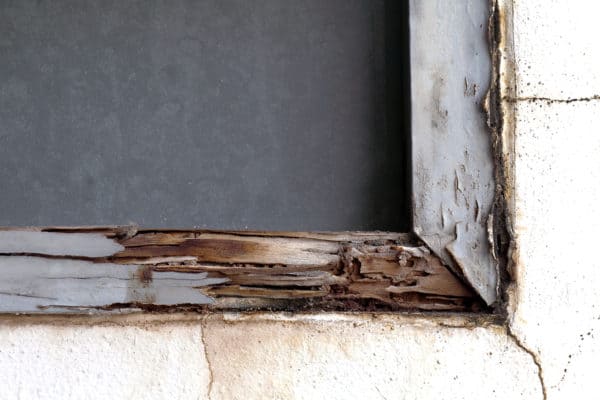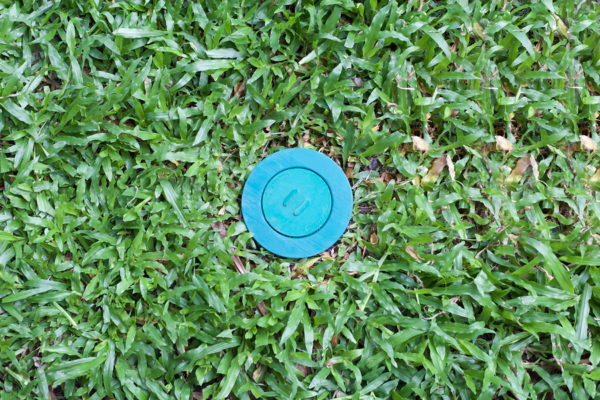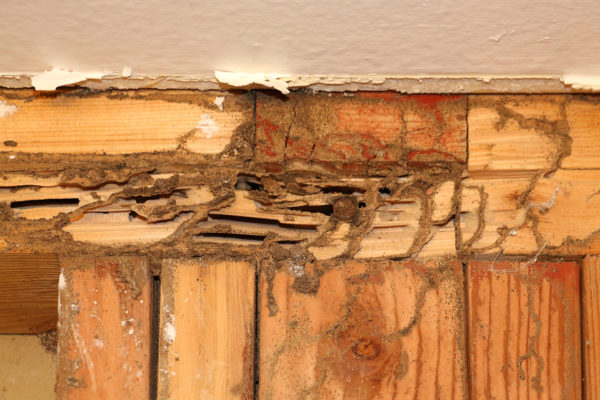READY TO GET STARTED?
REQUEST A FREE ESTIMATE
Fill out the form below or call (888) 466-7849 for a free, no-obligation estimate.

When it comes to protecting your home from termites, your best bet is not to rely on just luck – termite prevention is critical to minimizing or completely avoiding the costly destruction termites can cause to your home. In fact, some cultures consider termites in the home bad luck. These cultures see termites as an omen of death in the near future for the homeowner; the only way to escape this ill fate is to eliminate the termite colony or abandon the infested home.
If prevention fails, early detection is the next best thing. Termites can cause significant damage to your home while remaining undetected for years. For this reason, annual termite inspections can help identify these pests early, saving you from costly long-term damages.
Prevention is key. Here are a few tips for termite prevention in your home:
Termites will look for any way possible into your home in search of food. Try to reduce any soil to wood contact around your home by getting rid of any lumber, mulch, plants, or wood from your foundation. Try to also keep at least a 4 inch barrier between any mulch used in your landscaping and the side of your home. If possible, use pine straw instead of mulch as it is less appetizing for termites. Keep shrubbery trimmed back at least 12 inches from the walls of your home and get rid of any fallen branches, dead wood, or old tree stumps on your property.
Make sure your storm drains are directed away from the foundations and that they drain at least a few feet from foundations. Check for and repair any leaky faucets, pipes, or appliances and eliminate any other sources of excess moisture in your home. Keep sprinkler heads pointed away from foundations. If you have a crawlspace, consider crawlspace enclosure to not only help eliminate moisture under your home, but prevent mold, mildew, wood rot, and pests from getting into your home.
Most subterranean termites swarm during spring while drywood termites usually swarm in late summer and early fall. Be mindful of termite swarming season and make sure your outdoor lights are turned off at night. If possible, try to relocate any exterior lights to recessed areas away from doors and windows as swarmers are attracted to light.
Keep an eye out for signs of termites in your home. Discarded wings and evidence of frass are sure signs you have termite tenants. Other signs include blistering sheetrock, mud tunnels, cracks in your foundations, and a hollow sound when tapping on wood. Make sure the exterior of your home is well maintained to prevent these by inspecting and repairing wood siding and window frames.
Termites can be difficult to detect for long periods of time and even more difficult to get rid of once they are established. If you suspect you have a termite problem or if you want to get a step ahead of the prevention game, contact a professional pest control company who can set you up with annual termite inspections and, if necessary, a termite control plan.
Energy Saving for the Holidays
Should You Enclose Your Crawlspace in Winter?
Keeping Pests Away From Your Holiday Treats

Spring is the time of year when termites swarm, emerging to mate and establish new colonies. Unfortunately, these new colonies are often established inside our homes. An average of 5 million US homes are infested each year by termites, causing an average of $5 billion in damage annually. What many people don’t realize is that termite damage isn’t covered by homeowner’s insurance policies. What’s a homeowner to do? One thing to consider is the Sentricon Always Active bait system for termite control. Sentricon is a highly effective, environmentally responsible treatment option for termites. What is included with the Sentricon system?
If you suspect you have a termite problem contact a professional pest control company who can provide you with a thorough inspection and recommend a comprehensive termite treatment and prevention plan.

If you’ve been outside lately you’ve probably seen signs of spring – blooming flowers, pollen that aggravates our allergies, and lots of new insects buzzing around. Another thing that spring brings is swarms – of termites! Termites are present year round but their swarming season is during spring and early summer.
Termites cause billions of dollars in damage to homeowners each year. Here in the Southeast, subterranean termites are the most common types and are particularly destructive. These insatiable eaters can damage not only wooden structures, but have even been known to cause damage to brick and concrete homes as well. Termites can invade your home through cracks and holes as small as 1/32 of an inch!
Swarms are most common in spring and summer because they are triggered by warm, humid weather. Swarming marks the start of a new termite colony. Winged termites leave their nests when they become overcrowded and their isn’t enough food to sustain them. They then take flight and actually reproduce in mid-air. The females will then shed their wings and fall back to the ground. They then go in search of a new location to start their colonies.
Swarmers don’t usually cause any damage but once they establish their new colonies their offspring can cause significant damage – usually within 2 years. If you see flying termites it can signal one of two problems:
If you see winged termites inside your home this is a good indication that you already have an established termite colony inside or that there is existing damage already.
What can you do to prevent termites from coming into your home? Check out these tips to keep the termites out!
As always, if you suspect you have termites or find signs of damage, contact a termite control company who can come in and do a thorough inspection and set you up with a comprehensive treatment plan.